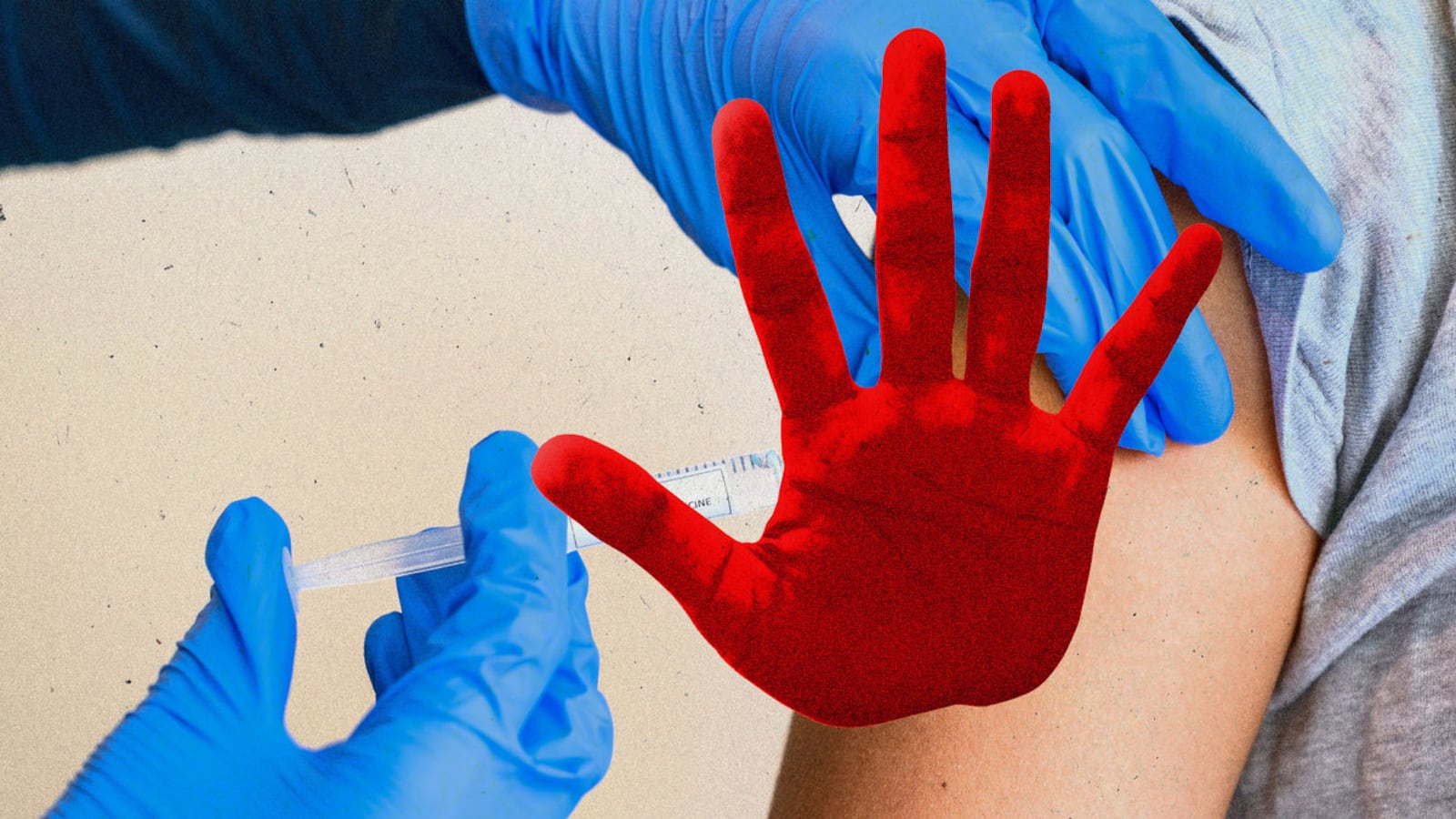On Monday, the surgeon general of one of the largest states in the country—already notorious for anti-science vaccine skepticism and visceral abhorrence of masks—said Florida’s Department of Health will soon make an official recommendation that will undoubtedly cost some kids their lives.
According to the Tampa Bay Times, Florida Surgeon General Joseph Ladapo announced the state health department would become the first in the country to actually recommend against vaccinating healthy children. Even in Gov. Ron DeSantis’ state, it’s disgraceful to hear such irresponsible guidance from a top health official.
After all, while the U.S. led the world in developing vaccines to end the pandemic, we are currently near the bottom among our peer nations for actually using those vaccines. For that reason alone, we are poised to soon pass 1 million deaths.
U.S. vaccine opponents have pointed to the decision by Sweden’s Health Agency to not allow COVID vaccines for all children aged 5-11. But the U.S. is not Sweden—where 73.3 percent of the adult population is fully vaccinated. And Sweden does recommend vaccination for kids 5 and over that are in high-risk groups.
By contrast, Florida is now actively telling parents NOT to vaccinate their kids.
Let’s be crystal clear. Vaccines are highly safe and effective. It’s far worse for children to get COVID-19 than to be vaccinated. It’s utterly irresponsible to suggest otherwise.
It’s been almost exactly two years since the COVID-19 pandemic smashed into the U.S.
Those dark early days wreaked havoc on our most frail and vulnerable populations like nursing home residents and front-line workers. Schools and businesses were shuttered, and a sense of hopelessness descended across the nation and the world.
Then, less than a year after the first outbreak came a modern miracle—the development of a highly safe and effective vaccine. Before COVID, the record for bringing a vaccine to the market was four years, for mumps. Usually, it takes a decade or more. For HIV/AIDS, a vaccine has yet to emerge.
Two COVID-19 vaccines—Pfizer/BioNTech and Moderna—used a novel mRNA technology for the first time in history. These vaccines had tremendous efficacy at preventing infections and, more importantly, preventing hospitalizations and deaths. But an avalanche of pernicious disinformation literally went viral on social media, which people are still using as their basis for fearing and rejecting the vaccine.
Much of the vaccine dissent maintains a laser focus on extremely rare side effects that are inherent in any vaccine or drug. Every day, most Americans reach into the medicine cabinet for an ibuprofen or another over-the-counter medication with far greater long-term adverse health effects than COVID-19 vaccines. Our children, specifically, all get a series of vaccines before going to school that have eliminated the scourge of measles, mumps, chickenpox, rubella, among many others.
As vaccine disinformation spreads, we have seen signs of a major backlash even against routine childhood vaccinations—one that folks like Ladapo seem determined to spread.
Vaccine skeptics like Ladapo tend to focus on the rare (but serious) side effects as reasons to refuse COVID vaccinations, especially for younger, otherwise healthy people.
Public health agencies want to understand the COVID vaccine’s rare side effects to ensure safety and maintain public trust. Indeed, the rare emergence of bleeding associated with the Janssen/Johnson and Johnson vaccine led to a 10-day stoppage, out of an abundance of caution.
Myocarditis has emerged as another rare side effect of the COVID vaccine, one touted by Florida’s surgeon general in a Wall Street Journal op-ed he co-authored last spring. If you’re vaccinated, skeptics might note, you have a 1-10 per million chance of developing inflammation of the heart muscle. Skeptics also point out that myocarditis is more common among individuals less than 40 years old, who are statistically at less risk for developing serious COVID than older people.
But context is necessary. Among this same age group, 40 per million of people who’ve contracted COVID will develop myocarditis.
Yes, reported cases of myocarditis are somewhat higher among adolescents, ranging from 70-106 cases per million among males 12-17. But, again, context is necessary. Almost everyone who experiences vaccine-associated myocarditis has a full recovery. We also now know that extending the time interval between vaccine doses decreases myocarditis risks even further. The CDC now recommends extending the time interval between the first two vaccine doses to eight weeks for males 12-29 years of age.
Many vaccine skeptics strongly believe that SARS-CoV-2 is inconsequential to younger people, nothing more than an annoying cold. For a fair number of people, that may be true. But even in this group, there is risk for serious illness and hospitalizations—and though it’s rare, there is a risk of death.
As of March 4, there had been 663 COVID deaths among individuals 5-18 years of age, and 37,596 deaths among those 19-44 years of age. And then there are the long-term consequences with potentially debilitating “long-COVID,” serious organ dysfunction with multisystem inflammatory syndrome (MIS-C), or new-onset diabetes—which is 2.5 times more likely to develop after COVID-19 infection in those 18 years and younger.
Unvaccinated 12–29-year-olds are 10 times more likely to be hospitalized than vaccinated adolescents. Data released from CDC on March 4 demonstrate that completion of the vaccine series, including the booster, raises effectiveness against infection among those aged 12-17 years of age—with restoration of effectiveness to up 81 percent, providing reassurance for this younger age group in combating infection.
When we look at vaccine effectiveness across all age groups, the data are still more convincing. Individuals who are unvaccinated are twice as likely to become infected, and 14 times more likely to die from COVID-19; and compared with those who also took a booster shot of vaccine, the unvaccinated are three times more likely to test positive for COVID-19, and 41 times more likely to die from COVID-19.
The depth of misinformation about COVID-19 vaccines is stunning, including falsehoods like vaccines alter your DNA, contain live coronavirus, insert microchips, cause you to be magnetic, and negatively affect fertility. Ladapo is a disgrace for making it state policy to effectively appease this crowd, especially when it comes to kids.
The Kaiser Family Foundation finds that such misinformation is widespread, with 78 percent of adults saying they believe at least one false statement to be true or are unsure if it is true or false.
There is also a huge gap in belief in false information based on political affiliation. Consequently, as of October 2021, 17 percent of Democrats were unvaccinated compared with 60 percent of Republicans. Currently, residents of red states have a 50 percent greater chance of dying from COVID-19 than in blue states. Of the eight states that continue to have high rates of COVID-19 (exceeding 30 cases per 100,000), seven are red states with an average full vaccination rate of 57 percent, below the national average of 65 percent as of March 4, 2022.
Almost two million COVID-19 cases have been diagnosed among children between the ages of 5-11 in the U.S. And yet, as of March 2, only 26 percent of children in that age group had completed their SARS-CoV-2 vaccine series. In Florida, where Ladapo holds a prominent government position of high public trust, the figure of kids in that same age group who had even one shot was just 22 percent, according to the Tampa Bay Times.
Although approximately 57 percent of adolescents nationwide ages 12-17 years have completed their vaccine series, only 21.4 percent of adolescents 12-17 have completed their additional booster dose. Much of the reluctance to complete the vaccines are based on the perception of possible side effects, and the expectation of mild disease in these age groups. Hence, even parents who themselves are up to date with their COVID vaccination are hesitant to complete the recommended vaccination series for their child.
These parents think they are protecting their child, but in fact, they are leaving them at needless risk and with the potential for continued secondary transmission of infection to others. The benefits far outweigh the risks.
As we reflect on where we are, where we have been, and where we want to go, let us not allow our individual or collective response to be defined by rare events, or to turn our backs on the miracles of science. We wait for those who have been sitting on the sidelines to join us in our efforts to build our shield against any future variants to allow us to resume and maintain normal lives.
But we won’t hold our breath that government officials in Florida, like Ladapo and DeSantis, will be taking the lead.









